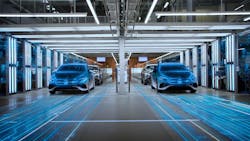Mercedes-Benz announced that it is now using digital twin technology to plan, retool and ramp-up production of its new Mercedes Modular Architecture (MMA) platform at its factories in Rastatt, Germany, Kecskemét, Hungary, and Beijing, China.
According to Mercedes-Benz, the introduction of MMA marks the next step in making the company’s MO360 digital production ecosystem more intelligent. The company uses this flexible production system to network dozens of Mercedes-Benz plants worldwide using real-time data. With MO360, Mercedes-Benz can produce electric, hybrid and combustion models on one factory line to scale the production of electric vehicles.
With its new Digital First approach, the new production line for new models on the MMA platform in the Rastatt plant can be modified, configured and optimized using high-precision digital simulation techniques. The exact position of machines, supply routes and production lines can be determined and simulated in advance without interrupting the production of the current compact cars A- and B-Class, GLA and EQA.
Furthermore, production can be ramped up significantly faster when compared to a conventional planning process. The virtual ramp up in Rastatt will serve as a blueprint for the global production network, which includes cooperation with the plant in Beijing.
Digital twin in production
For the plant expansion in Kecskemét, Mercedes-Benz has created a complete digital depiction of the entire hall for the first time. For this, the company uses Nvidia Omniverse, a platform for developing Universal Scene Description (OpenUSD) applications for industrial digitalization, such as digital twins.
The digital twin includes the entire building and the infrastructure in it as well as break areas and changing rooms for the employees. With the digital twin for production, assembly areas can be planned, retooled and inspected virtually while taking into account the need for short distances, sufficiently wide aisles, and even fire protection.
Mercedes said the virtual ramp-up guarantees the increased speed, transparency and flexibility of production processes without the obligation to use cost-intensive hardware. Using Omniverse, Mercedes-Benz can interact directly with its suppliers, reduce coordination processes by 50%. Using a digital twin doubles the speed for converting or constructing an assembly hall while improving the quality of the processes. With the data collected in the virtual world, assembly processes can be optimized even faster and potential errors can be detected at an early stage without real-world interference.
Speaking of the company’s increasing use of digital twin technology, Jan Brecht, chief information officer of Mercedes-Benz Group AG, asked: “What if reality becomes a representation of the digital, rather than the digital being a representation of reality? Our vision in the future is getting trust in digital twins the same as we do in physical reality.”
Deploying AI for efficiency
Mercedes noted that the introduction of artificial intelligence (AI) with this project opens new areas of energy and cost-savings. For example, the Rastatt plant is being used to pioneer digital production in the paint shop. AI was used to help create efficiency gains in topcoat booths, where vehicle chassis get their paint and protection layers.
Instead of using a programmable logic controller (PLC), AI handles the monitoring of the relevant sub-processes in the pilot testing, which led to energy savings of 20% when compared to conventional PLC control.
Effect on vehicle OS
The Mercedes-Benz Operating System (MB.OS) will be used in series production for the first time under this Digital First initiative. The company said MB.OS in the vehicle and the technologies in production derived from it enable ten times faster software updates than before, while simultaneously increasing the amount of data.
Due to the direct link of production to the Mercedes Intelligent Cloud (MIC), all vehicles leave the production with up-to-date software. This also allows Mercedes-Benz to add to its over-the-air software strategy for vehicles that have already been delivered. Software optimizations can be rolled out globally within just a few hours, which significantly increases the safety and quality of the vehicles and ensures compliance with increased certification requirements.
The MIC is directly connected to the MO360 Data Platform within the development, production and fleet operations network. The MIC is responsible for software update packages and installation processes. Both are linked via an intelligent analysis interface so that every employee can read and analyze the current software status of any vehicle in the network using the MO360 Data Platform. This is supported by an app for intelligent defect diagnosis (predictive failure prevention). The app detects potential errors at an early stage and uses an intelligent algorithm during the production process to provide instructions for quality assurance.

